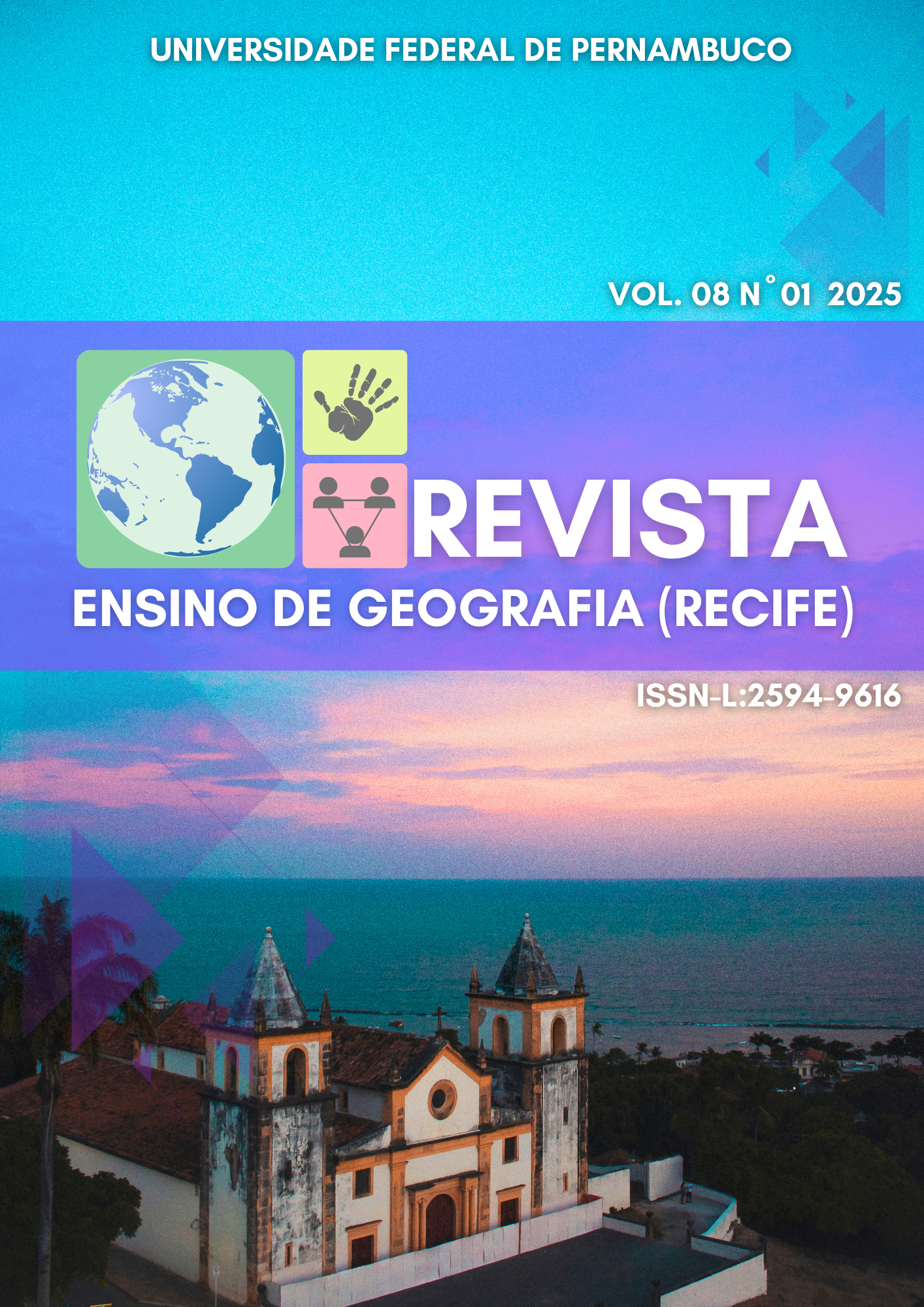Geotechnologies and cartographic literacy: constructing the concept of legend through Google Earth
DOI:
https://doi.org/10.51359/2594-9616.2025.266175Keywords:
geotechnologies , cartographic literacy , cartographic legend , Google Earth, geography educationAbstract
The article discusses the importance of cartographic literacy in Geography education, especially in light of educational transformations driven by new technologies. The main objective is to present a pedagogical experience conducted in 2021 with 6th-grade elementary school students, using Google Earth to reconstruct cartography learning, which was hindered by the COVID-19 pandemic. The adopted methodology involved practical activities at the State School of Campo de Porto Mendes, in Marechal Cândido Rondon, aiming to make learning more dynamic and interactive. Students explored elements such as scale, location, and orientation through the digital tool, allowing them to visualize and interpret maps more meaningfully. The development of the experience focused on constructing the concept of a cartographic legend, an essential aspect of map comprehension. Google Earth enabled students to create representations of geographic space using colored polygons, facilitating the association between real elements and their symbolic representation. The interactivity provided by the platform supported the abstraction necessary for cartographic understanding. The final considerations highlight that the use of geotechnologies enhances cartographic literacy and makes Geography education more engaging. However, challenges related to school infrastructure and teacher training still exist. It is concluded that the integration of cartography and technology can significantly contribute to learning, preparing students for a more critical and informed reading of geographic space.
References
BRASIL. Ministério da Educação. Base Nacional Comum Curricular. Brasília: MEC, 2018.
CASTROGIOVANNI, A. C.; COSTELLA, R. Z. Brincar e Cartografar Com os Diferentes Mundos Geográficos: a alfabetização espacial. 1. ed. Porto Alegre: EDIPUCRS, 2006.
CAVALLINI, G. M.; PINHEIRO, I. A.; RICHTER, D. A potencialidade dos mapas digitais para o ensino de Geografia. Geografia Ensino & Pesquisa, Santa Maria, v. 28, e85068, 2024.
CONZATTI, Shana. Planejamento anual e diário: Guia de planejamento no Fundamental I com a BNCC. eBook Kindle: São Paulo, 2018.
DAPPER, Vanderson Rafael Muller. Os saberes e as práticas dos professores do Ensino Fundamental - anos iniciais sobre a alfabetização cartográfica para a implementação da BNCC no território brasileiro. 2021. 174 f. Dissertação (Mestrado em Geografia) - Universidade Estadual do Oeste do Paraná, Marechal Cândido Rondon, 2021.
FARIA, Amanda Rafaela. A utilização de geotecnologias: proposta de oficina pedagógica para promoção da alfabetização cartográfica e do ensino de geografia. 15/05/2022 112 f. Mestrado em Metodologias para o Ensino de Linguagens e suas Tecnologias Instituição de Ensino: Universidade Pitágoras Unopar, Londrina Biblioteca Depositária: UNOPAR, 2022.
GUERREIRO, Ana Lúcia. Alfabetização e letramento cartográficos na Geografia escolar. São Paulo: Edições SM, 2012.
NOGUEIRA, Ruth Emilia. Cartografia: representação, comunicação e visualização de dados espaciais. 2 ed. Florianópolis: Editora da UFSC, 2008.
PEREIRA, Luiz Sidney Barcelos. A orientação geográfica como recurso didático. Francisco Beltrão, 2014. 177 p. Dissertação (Mestrado) - Universidade Estadual do Oeste do Paraná, Francisco Beltrão, 2014.
RIBEIRO, Romulo Afonso Santos; FRANCISCHETT, Mafalda Nesi. A cartografia escolar crítica e as tecnologias no ensino de geografia. Revista Signos Geográficos, [S. l.], v. 3, p. 1–17, 2021.
SIMIELLI, Maria Elena Ramos. Cartografia no Ensino Fundamental e Médio. In: CARLOS, Ana Fani Alessandri (Organizadora). A Geografia na sala de aula. São Paulo: Contexto, 1999.
SIMIELLI, Maria Elena Ramos. O mapa como meio de comunicação e a alfabetização cartográfica. In: ALMEIDA, Rosângela Doin de. Cartografia Escolar. São Paulo: Contexto, 2011.
SOUSA, Iomara Barros. Geotecnologias e Recursos de Multimídia no Ensino de Cartografia: Percepção Socioambiental do Rio Alcântara no Município de São Gonçalo/RJ. 177 f. Dissertação (Mestrado em Geografia) – Instituto de Geografia, Universidade do Estado do Rio de Janeiro, Rio de Janeiro, 2014.
Downloads
Published
How to Cite
Issue
Section
License
Copyright (c) 2025 Vanderson Rafael Muller Dapper

This work is licensed under a Creative Commons Attribution 4.0 International License.
Authors who publish with this journal agree to the following terms:- Authors retain copyright and grant the REVISTA ENSINO DE GEOGRAFIA (RECIFE) right of first publication with the work simultaneously licensed under a Creative Commons Attribution NonCommercial International 4.0 (CC BY-NC) that allows others to share the work with an acknowledgement of the work's authorship and initial publication in this journal.
- Authors are able to enter into separate, additional contractual arrangements for the non-exclusive distribution of the journal's published version of the work (e.g., post it to an institutional repository or publish it in a book), with an acknowledgement of its initial publication in this journal.
- Authors are permitted and encouraged to post their work online (e.g., in institutional repositories or on their website) prior to and during the submission process, as it can lead to productive exchanges, as well as earlier and greater citation of published work.



